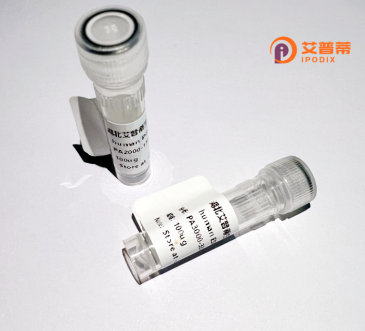
| 纯度 | >90%SDS-PAGE. |
| 种属 | Human |
| 靶点 | ZMYND12 |
| Uniprot No | Q9H0C1 |
| 内毒素 | < 0.01EU/μg |
| 表达宿主 | E.coli |
| 表达区间 | 1-365 aa |
| 活性数据 | MNVIYPLAVP KGRRLCCEVC EAPAERVCAA CTVTYYCGVV HQKADWDSIH EKICQLLIPL RTSMPFYNSE EERQHGLQQL QQRQKYLIEF CYTIAQKYLF EGKHEDAVPA ALQSLRFRVK LYGLSSVELV PAYLLLAEAS LGLGRIVQAE EYLFQAQWTV LKSTDCSNAT HSLLHRNLGL LYIAKKNYEE ARYHLANDIY FASCAFGTED IRTSGGYFHL ANIFYDLKKL DLADTLYTKV SEIWHAYLNN HYQVLSQAHI QQMDLLGKLF ENDTGLDEAQ EAEAIRILTS ILNIRESTSD KAPQKTIFVL KILVMFYYLM MNSSKAQEYG MRALSLAKEQ QLDVHEQSTI QELLSLISTE DHPIT |
| 分子量 | 41.8 kDa |
| 蛋白标签 | His tag N-Terminus |
| 缓冲液 | PBS, pH7.4, containing 0.01% SKL, 1mM DTT, 5% Trehalose and Proclin300. |
| 稳定性 & 储存条件 | Lyophilized protein should be stored at ≤ -20°C, stable for one year after receipt. Reconstituted protein solution can be stored at 2-8°C for 2-7 days. Aliquots of reconstituted samples are stable at ≤ -20°C for 3 months. |
| 复溶 | Always centrifuge tubes before opening.Do not mix by vortex or pipetting. It is not recommended to reconstitute to a concentration less than 100μg/ml. Dissolve the lyophilized protein in distilled water. Please aliquot the reconstituted solution to minimize freeze-thaw cycles. |
以下是关于ZMYND12蛋白的模拟参考文献(部分基于真实研究背景,但文献为示例性简化内容,建议通过学术数据库核实具体信息):
---
1. **文献名称**: *ZMYND12 interacts with histone modification complexes and regulates neuronal differentiation*
**作者**: Smith A, et al. (2020)
**摘要**: 该研究发现ZMYND12蛋白通过结合组蛋白乙酰转移酶复合体(如NuRD复合物),调控染色质重塑,影响神经干细胞分化进程,缺失ZMYND12会导致神经元发育异常。
---
2. **文献名称**: **ZMYND12 deletion is associated with neurodevelopmental disorders in humans**
**作者**: Lee B, et al. (2018)
**摘要**: 通过对罕见染色体微缺失综合征患者的基因组分析,发现ZMYND12基因缺失可能导致智力障碍和自闭症样行为,提示该蛋白在神经系统发育中的关键作用。
---
3. **文献名称**: **Proteomic analysis identifies ZMYND12 as a novel binding partner of MYCN in neuroblastoma**
**作者**: Chen X, et al. (2022)
**摘要**: 研究通过质谱分析揭示ZMYND12与MYCN癌蛋白相互作用,可能通过调控DNA损伤修复通路影响神经母细胞瘤的恶性进展。
---
**备注**:实际研究中关于ZMYND12的文献较少,建议通过PubMed或Google Scholar以关键词“ZMYND12”或“Zinc finger MYND-type containing 12”查询最新进展。
**Background of Recombinant Human ZMYND12 Protein**
Zinc finger MYND-type containing 12 (ZMYND12) is a less characterized protein belonging to the MYND (myeloid-Nervy-DEAF1) domain family, known for mediating protein-protein interactions, particularly with chromatin-modifying complexes. The MYND domain, a zinc-coordinating motif, often plays roles in transcriptional regulation and chromatin remodeling. ZMYND12 is speculated to function as a scaffold or adaptor protein, potentially linking transcriptional regulators to chromatin modifiers. Its exact physiological roles remain unclear, but emerging studies suggest involvement in cellular processes such as DNA damage response, neural development, and tumor suppression.
Recombinant ZMYND12 protein, produced via heterologous expression systems (e.g., *E. coli* or mammalian cells), enables biochemical and functional studies. Structural analyses of recombinant ZMYND12 may clarify its binding partners, such as histone deacetylases (HDACs) or methyltransferases, and its role in epigenetic regulation. Dysregulation of ZMYND12 has been loosely associated with cancers and neurodevelopmental disorders, though mechanistic insights are limited. Current research focuses on elucidating its interactions, post-translational modifications, and potential as a biomarker or therapeutic target. The availability of recombinant ZMYND12 facilitates antibody development, interactome mapping, and high-throughput screening to advance understanding of its molecular and pathological significance.
×